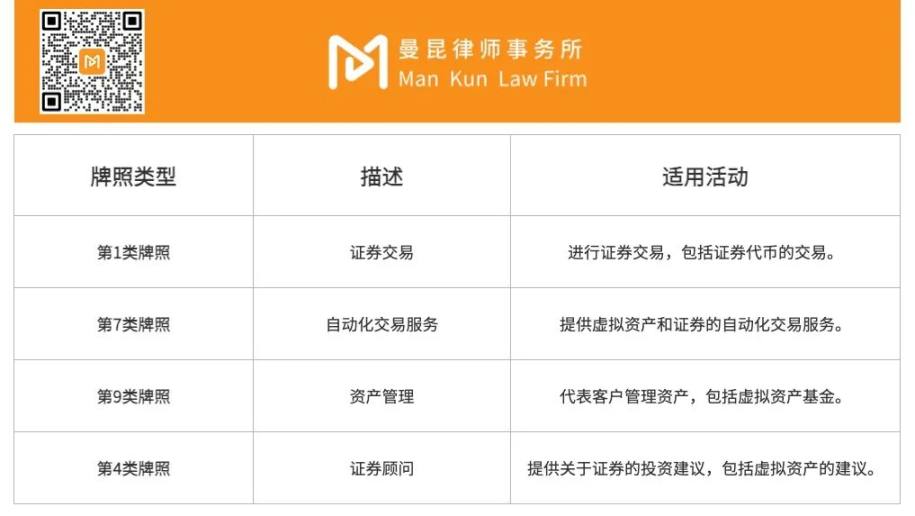The difference between the two directly affects the regulatory approach of different entities under Hong Kong law.
Author: Bai Zhen, Head of the Hong Kong Office of Shanghai Man Kun Law Firm
Against the backdrop of the continuous evolution of virtual assets, understanding the relevant terminology and regulatory framework is crucial for industry participants. In Hong Kong, two key terms frequently appear in this context - "Virtual Asset Service Provider" (VASP) and "Virtual Asset Trading Platform" (VATP). Although these two terms are related, they are not entirely the same. VASP is a broad concept that encompasses various entities involved in virtual asset activities, while VATP specifically refers to platforms that facilitate virtual asset trading.
Distinguishing between these two concepts is important because it directly affects the regulatory approach of different entities under Hong Kong law. The Securities and Futures Commission (SFC) of Hong Kong has formulated specific regulatory guidelines for VATP and other VASP. Due to the direct involvement in the trading and custody of virtual assets, VATP is subject to stricter regulation, especially in terms of security measures, anti-money laundering and counter-terrorism financing compliance, and investor protection. On the other hand, VASP such as virtual asset fund managers and advisors are also regulated, but their regulatory focus is more on risk management, client disclosure, and operational integrity.

Before delving into the differences between VASP and VATP, let's first review the definition of "virtual assets" in Hong Kong:
According to the 2022 Anti-Money Laundering and Counter-Terrorist Financing (Amendment) Ordinance (AMLAO), virtual assets are defined as:
- Digitized representations of value that are cryptographically secured and can be transferred, stored, or traded electronically, and can be used for payment or investment purposes, such as cryptocurrencies and other asset categories in the virtual world.
- Digitized representations of rights, qualifications, or access permissions that are cryptographically secured and can grant control, governance, or application to any digitized representation of value, such as governance tokens.
Note: According to AMLAO, the following are not within the scope of the definition of virtual assets:
- Digitized representations of value issued by central banks or governments
- Limited-purpose digital tokens
- Securities or futures contracts
- Any floating funds or deposits related to stored value facilities
So why is the above definition so important? Its importance lies in the fact that AMLAO strictly limits the definition of virtual assets to "non-securities," excluding virtual assets defined under the Securities and Futures Ordinance (SFO).
Typically, when we think of Type 1 licenses issued by the SFC, we know that they are related to "securities trading" activities. Therefore, the definition of "virtual assets" mentioned above was originally beyond the regulatory scope of the SFC. However, under the new virtual asset regulatory regime in Hong Kong, if you hold an SFC license and your business involves virtual assets, you will need to comply with both securities-related regulations under the SFO and the AMLAO, as well as other relevant laws, regulations, and guidelines.
In Hong Kong, you may hear the term "dual regulation," and the regulations mentioned above are what "dual regulation" refers to. This means that the SFC adopts a dual regulatory approach to virtual asset intermediaries to ensure:
- Regulation of virtual assets classified as securities (through the SFO); and
- Regulation of virtual assets not classified as securities (through AMLAO).
Subdivision under the Big Umbrella: Virtual Asset Service Providers (VASP)
The concept of VASP is defined by the Financial Action Task Force (FATF) in its guidance, which Hong Kong also follows. According to FATF's guidance, VASP includes any natural person or legal entity engaged in one or more of the following activities or operations on behalf of others:
- Exchange between virtual assets and fiat currency
- Exchange between one or more virtual assets
- Transfer of virtual assets (in this context, "transfer" refers to transactions conducted on behalf of another natural person or legal entity, moving virtual assets from one virtual asset address or account to another)
- Custody or management of virtual assets, or providing tools to control virtual assets
- Involvement in financial services related to the issuance and sale of virtual assets by issuers
From this broad definition, it can be seen that it covers various entities, including but not limited to:
- Virtual asset fund managers
- Virtual asset advisors
- Virtual asset custodians
- Virtual asset wallet providers
- Financial service providers involved in the issuance, sale, or provision of virtual assets, such as service providers in ICO projects
Each entity plays a unique role in the virtual asset ecosystem and is subject to different regulatory requirements based on the specific activities they engage in.
For example, virtual asset fund managers managing portfolios containing virtual assets need to implement robust risk management frameworks to protect investors. They must also provide clear and accurate virtual asset risk disclosures to clients. Similarly, virtual asset advisors providing virtual asset investment advice are expected to maintain high standards of conduct and ensure that their advice is suitable for their clients' needs. Custodians, representing others holding virtual assets, must implement strict security measures to prevent theft or loss of these assets.
In addition, the definition of VASP also includes transactions and operations involving:
- Virtual-to-virtual transactions
- Virtual-to-fiat currency transactions

Other licenses may also be required based on the nature of business activities. For example, entities engaging in futures contract trading need to apply for a Type 2 license, while those providing advice for corporate finance require a Type 6 license.
Focus under the Small Umbrella: Virtual Asset Trading Platforms (VATP)
Now that we have clarified what VASP is, what is VATP?
VATP can be described as a type of VASP that focuses on facilitating virtual asset trading, exchange, and typically custody. As an intermediary, VATP connects buyers and sellers of virtual assets, enabling them to trade in a secure and regulated environment.
VATP plays a crucial role in the virtual asset ecosystem, providing liquidity and driving price discovery for various virtual assets. In Hong Kong, VATP is subject to specific regulation prescribed by the SFC. If VATP involves the trading of at least one virtual asset classified as a security, it must be licensed in Hong Kong. This means that once a VATP offers trading of security tokens, the platform operator will need to obtain the following licenses in Hong Kong:
- Type 1 license (securities trading)
- Type 7 license (automated trading services)
If VATP does not involve any virtual asset trading classified as securities, it still needs to comply with other relevant requirements (such as AML/CFT requirements), but does not require an SFC license under the existing framework.
When regulating VATP in Hong Kong, the SFC primarily focuses on regulating centralized virtual asset trading platforms, rather than regulating peer-to-peer trading markets where investors typically retain control over their fiat currency assets or virtual assets.
If an entity applies for an SFC VATP license but only provides routing services and does not genuinely offer automated trading services related to virtual assets, the SFC will not accept its license application.
Conclusion by Man Kun Law Firm
Understanding the difference between VASP and VATP is crucial for anyone involved in the virtual asset industry. VASP is a broad term that encompasses a wide range of entities, including virtual asset fund managers, advisors, and custodians. VATP, on the other hand, is a specific subcategory of VASP that focuses on facilitating virtual asset trading.
This distinction is very important because it affects the regulatory approach of different entities under Hong Kong law. Due to the high risks associated with virtual asset trading and custody, VATP (Virtual Asset Trading Platform) must comply with strict regulatory requirements. Other VASP (Virtual Asset Service Providers) are also regulated, but their focus is on risk management, client disclosure, and ensuring operational integrity. Therefore, operating entities in Hong Kong need to tailor compliance strategies based on the specific services provided by VASP, which helps ensure their safe and sound operation.
免责声明:本文章仅代表作者个人观点,不代表本平台的立场和观点。本文章仅供信息分享,不构成对任何人的任何投资建议。用户与作者之间的任何争议,与本平台无关。如网页中刊载的文章或图片涉及侵权,请提供相关的权利证明和身份证明发送邮件到support@aicoin.com,本平台相关工作人员将会进行核查。



